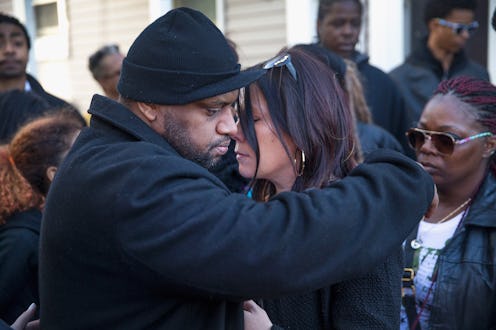News
Over A Thousand Mourned At Tony Robinson's Funeral
More than a week has passed since Tony "Terrell" Robinson's death, but Madison, Wisconsin, and the country at large is still reeling from the latest instance of a white officer fatally shooting an unarmed person of color. On Saturday, over a thousand people attended 19-year-old Tony Robinson's funeral and remembered the life of a young man that ended far too early. His death on March 6 has prompted another wave of protests over the continued mistreatment of black and brown bodies across the United States by law enforcement officials and the judicial system. Robinson's tragic death, taken in conjunction with the Department of Justice's damning report on Ferguson's civil misconduct, has served to further highlight the prevalent issues of race that remain in the United States today.
According to police, Robinson was shot and killed following a violent confrontation with a police officer, in which Robinson allegedly attacked 45-year-old Matt Kenny. Autopsy reports show that Robinson was shot in the head, torso and right arm, though these preliminary findings did not disclose how many times he was struck by Kenny's bullets. Mourners numbered so many that they exceeded Madison East High School's auditorium 1000-person capacity, and they were instead shepherded into the gym, where Robinson was remembered as "a good person."
His obituary, which was presented at the service, read:
Terrell was a passionate and compassionate young man, and a wonderful friend. He was always there when you needed him for an ear to listen, a deep conversation about life's complexities or just to make you smile.
Robinson's family has urged protestors to remain peaceful in their demonstrations, and thus far, their wishes have been largely heeded. In a statement before the funeral, family members noted, "While we appreciate the support in the form of peaceful protests, and justified anger about the manner in which his life was taken away from us too soon, this is not the venue to express that." Crowds of up to 2,000 have participated in protests across Madison, and echoes of "Black Lives Matter" have rung out across Wisconsin in the aftermath of the tragedy. Still, Robinson's family reminded others that Terrell's life was more than the way it ended — his aunt, Lorien Carter, said in his eulogy on Saturday, "Tony is not a victim. He's our own martyr, a champion of change. And for you I will always stand."
At his memorial, friends shared incredible remembrances of their time with Robinson, and many reminisced on one particular quote of his — "You ever have that feeling you're going to live forever? I'm going to change the world," he was known for saying. "He was always listening if you needed someone to talk to," one friend told mourners, and others commented on his consistent willingness to help others, a legacy that his family hopes to continue in his name. Craig Spaulding, whose son was Robinson's close friend, said the young man's death had to catalyze meaningful change. "Tremendous things are going to happen. Tremendous things have already happened," he noted.
These "tremendous things" must take place against a backdrop that remains disturbingly racially segregated — Madison, Wisconsin remains one of the worst cities in the United States when it comes to racial economic equality, The Guardian reports. In 2013, a study of Dane County, which contains Madison, found that 75 percent of black children in the county live in poverty, whereas only 5 percent of white children experience the same. Black adults are 11 times more likely to be arrested than their white counterparts, When it comes to arrest rates, and black youth are 15 times more likely to be arrested than white individuals. While African Americans make up just 6 to 7 percent of Dane County's total population, they make up 48 percent of Dane County Jail's inmates.
While Madison is generally thought to be a liberal bastion, the fact of the matter remains that racial prejudice and black struggles are relatively blind when it comes to political beliefs. Being a minority in America is made no easier by whether a state goes red or blue during federal elections — unfortunately, violence against black and brown bodies is rather color blind when it comes to politics.
Across the United States, black men are shot more frequently by police than effectively any other racial group, and by a staggering margin. For centuries in America, black men and women have been subjected to racism and violence, and even 50 years after the historic Selma protests, in some ways, it seems as though little has changed. 50 years ago, the Black Panthers raised their fists in a show of black power, and today, we raise our hands to cry, "Don't shoot."
Madison's police have certainly responded to Robinson's death with more sympathy and grace than Ferguson's, but still, the fact remains that a young man will never be able to tell his friends that he plans on changing the world again. And that simply must stop happening at the hands of the law.
Images: Twitter
